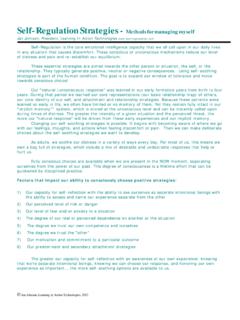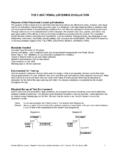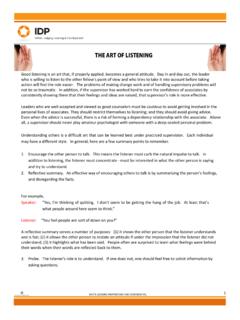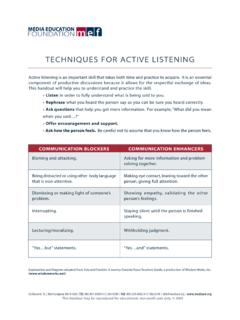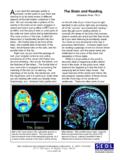Transcription of Empathy, Listening Skills & Relationships
1 1 empathy , Listening Skills & Relationships By: Lawrence J. Bookbinder, PhD Introduction, editing & additions by: Jan Johnson MA Introduction -- empathy Defined Most individuals think of empathy as having a sense of understanding and compassion for another person, sensing what it must be like to be them. As we work to develop a measure of empathy in our EQ assessment tool, we have identified three key aspects of empathy . These include 1) Empathic accuracy: being able to sense what the other person is experiencing from their internal experience, 2) Empathic compassion: being able to be open to another's experience with compassion and tolerance, and 3) Empathic interactions: the process of interacting in an empathic manner. Empathic acknowledgment is the core process and precise skill of empathic interactions.
2 While the concept of empathy is embraced, the specific Skills required are not widely known and certainly not widely practiced. Dr. Bookbinder states less than 2% of interactions include acknowledgement of the other, the foundation for all empathic interactions. This article highlights the critical elements of empathic acknowledgement and the precise Skills required for effective, powerful empathic interactions. Empathic Acknowledging Empathic acknowledging combines Listening , empathizing, and acknowledging what the other person said and his or her experience. It typically improves Relationships and often deepens emotional intimacy. It leads to feeling like you have received a "psychological hug". Why? The following encounter illustrates empathic acknowledgement.
3 NOTES are interjected to highlight the concept. Illustration: The Astonished Man (Dr. Bookbinder experience) I was walking to the exit of a four-story parking building next to a five-story medical clinic. The day was Friday, the time was 2:25 pm, and the building was crammed with cars. A man, who appeared about 75-years-old, walked in. As he neared me, he stopped, turned towards me and said: "Are they giving something away today? I've never seen it so crowded." He appeared unable to believe that the building was filled to capacity. "I'll bet it's because many people don't work on Fridays, so it's convenient for them to schedule their appointments on Fridays," I said. (NOTE: My response did not acknowledge either his perception of the building as crowded or his astonishment that it was crowded.)
4 I had given him an explanation, not an acknowledgement.) "It's not because it's Friday. I usually come here on Fridays and it's never been this crowded," he said. "It is very crowded today, and I don't know why," I said. (NOTE: I had now acknowledged his perception that the building was crowded! He probably would have been more satisfied if I had also acknowledged his feeling.) Discussion In the situation above he listened to the astonished man and empathized with his perception that the garage was full. He acknowledged the man by spending time Listening to the astonished man s" statement and acknowledging his statement by stating his understanding of it. 2 Key elements to Empathic acknowledgements: Listening to what the other is saying Acknowledging what was said, including stating your understanding of what was said and the feelings associated with what was said The Psychological Hug One important benefit of empathic acknowledging is the psychological hug.
5 The psychological hug is similar to a physical hug in that it expresses affection by a special type of touch. This affection and touch is illustrated by the interaction between friends below. Empathic acknowledging can be effective between any two people when one of them is talking about something that is important to him or her. An Illustration: The Upset Friend Tanya and Anita, who are in their twenties, meet for lunch one Friday after not having talked with each other for two months. Tanya (talker) began in delight. "I saw Ben yesterday. You remember Ben? I told you about him last time." Anita acknowledged, "Sure. You met him a month before our last lunch and found him attractive." "That's right," Tanya says, eyes sparkling. "Since then I've learned that he's good for me.
6 We've been seeing a lot of each other lately and getting close. I'm excited!" As Tanya begins to pour out the details of her recent experiences with Ben, Anita says to herself, I was going to tell her about my super vacation plans but this relationship sounds really important to her. I'll wait and listen to her news first. (NOTE: Anita suppresses the impulse to talk) Five minutes later, Tanya concludes with her announcement. "Last Tuesday he told me he loved me", followed by her exclamation, "I couldn't believe it!" After Listening for the entire time without saying a word, Anita says, "Wow!" (NOTE: Anita acknowledges Tanya's feeling of being overwhelmed) "I still can't believe it," Tanya says. "I didn't know what to say. I still don't know what to tell him.
7 " "I don't understand," Anita says. "Did he expect you to say how you felt about him?" (Note: Anita clarifies what is being said) Tanya responds "I didn't think so but I wanted to say something and yet I didn't want to. I'm confused." Her face changes from pink to pale and she stops talking. "It's hard for you to talk about this." "I didn't think it would be so hard but I do want to tell you," Tanya says. "I, uh, I feel strongly about Ben." She struggles to speak but again stops, and her face turns paler. After waiting ten seconds, Anita says "And what else?" She then resumes being quiet and waits for Tanya to regain her ability to speak. (Note: Anita waits & encourages Tanya to continue) Sixty more seconds pass and then Tanya's jaw tightens as she says, "I want to tell you how I really feel about him.
8 He's a wonderful man and I'm, uh, I'm very fond of him." She pauses. "I'm more than fond of him. I, uh, I, uh, I love him. There, I finally said it. Whew!" As she listens to Tanya open up emotionally, Anita develops a lump in her throat and a warm feeling in her chest. She gulps, pauses to collect her thoughts, and softly says, "It's hard for you to talk about your love for Ben." (Note: Anita acknowledges what is being said & the feelings) You honor the person talking when you spend the time to listen& the energy to pay attention. 3"Definitely," Tanya says. "After Tuesday, I decided that the next time I saw him I would tell him how I felt about him. Well, the next time came and I still couldn't tell him. There must be something seriously wrong with me." "You're saying that no matter how hard you try, you can't tell him you love him, and you feel awful about yourself because you can't.
9 " (Note: Acknowledgement of what is being said and feelings) "Right!" Tanya says. "I've been keeping it to myself and becoming terribly upset about it. I'm glad I told you because you didn't criticize me for not speaking up. Your understanding touches me." Her face relaxes and begins to regain its color. With affection in her eyes and gentleness in her voice, Tanya says, "I feel better. Thanks for letting me talk." "Glad to do it", Anita says. Her face brightens as she says "Now I want to tell you about a two-week vacation in Cape Cod I'm planning, which I can't wait to begin." Then she leans forward and delightedly describes her plans to Tanya, who, because of no longer being upset, is able to listen attentively. Discussion & Conclusion: Key elements of empathic acknowledgment illustrated above.
10 Does not interrupt Does not give advice Does not change the subject to talk about her own plans Does not voice disapproval of the other Tunes into the other s communications (what is being said & her feelings) States her understanding of what is being said and felt The impact Anita's (Listener) empathic acknowledgement had on Tanya (talker) Appreciation for being listened to Experience as receiving a gift of time and attention without criticism or advice Increased trust of myself (the talker) and increased trust in the other and the relationship The feeling of receiving affection, a psychological hug that touches the heart Reduced Tanya's distress Helped Tanya (talker) to get in touch with her thoughts, wants, and feelings Strengthened the relationship Benefits to the Talker Experiencing a psychological hug is one of several possible benefits for the talker.


